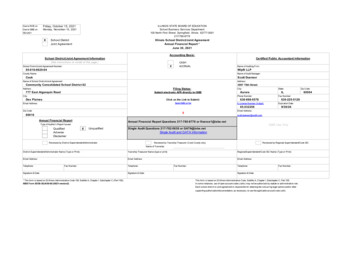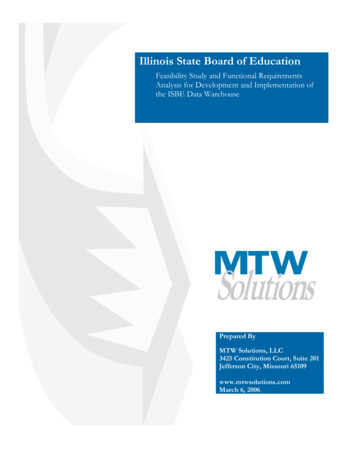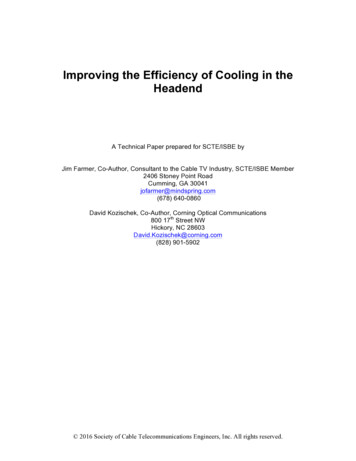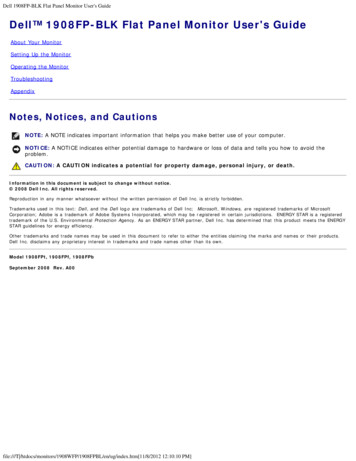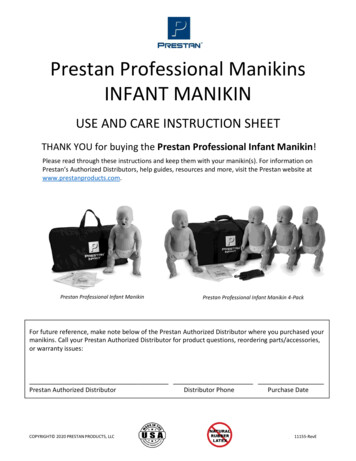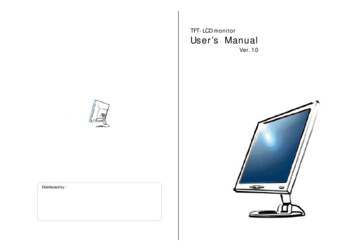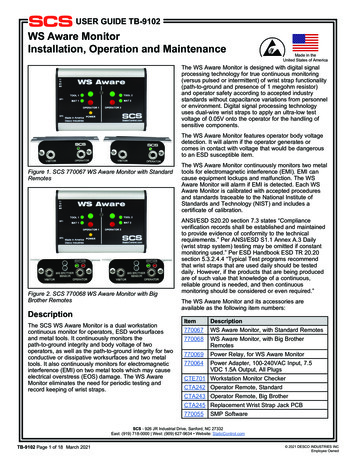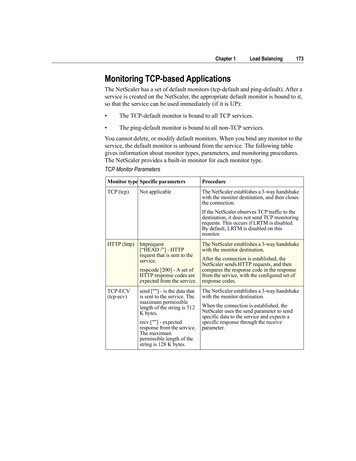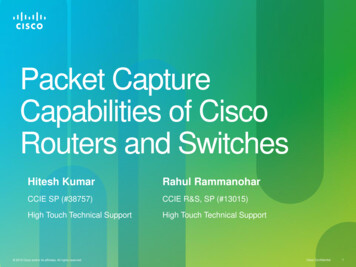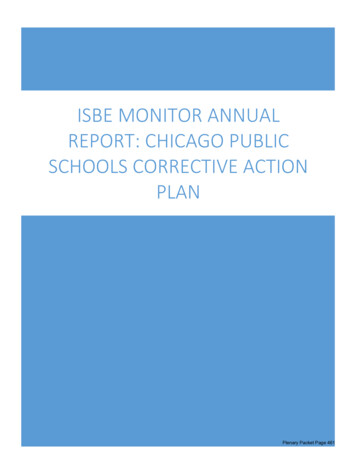
Transcription
ISBE MONITOR ANNUALREPORT: CHICAGO PUBLICSCHOOLS CORRECTIVE ACTIONPLANPlenary Packet Page 461
Executive SummaryThe Illinois State Board of Education Monitor Annual Report (Report) highlights the progressand results of the Chicago Public Schools Corrective Action Plan from the 2018-19 school year(Corrective Action Plan). The Report provides background information regarding the PublicInquiry that was conducted by the Illinois State Board of Education (ISBE) during the 2017-18school year.The Report also provides information and updates on engagement activities and the specificcomponents of the Corrective Action Plan, which addresses the following strands: Strand A –ISBE Appointed Monitor, Strand B – IEP Meetings, Strand C – Electronic IEP System Use,Strand D – Data Collection, Strand E – Procedural Manual and Guidance, Strand F – Budgeting,Strand G – Stakeholder Involvement, Strand H – Additional Training Plan, Strand I – StudentSpecific Corrective Action. Overarching items to note in connection with the above Strandsinclude: The CPS electronic IEP system (SSM) no longer includes “locks and blocks,” whichprohibited IEP teams from accessing certain sections of electronic IEP document untilobtaining certain administrative approval or a certain amount of time passed. Oneexception, however, is that the SSM system continues to include a required approval priorto placing a student in an environment where the student is removed from the generaleducation placement for 100% of the school day, called a Separate Day School (SDS)placement by CPS. The Monitor continues to ensure this locked function does notconstitute noncompliance with the IDEA. CPS’ Procedural Manual has been updated with input from the ISBE Appointed Monitor.The CPS Procedural Manual , which was published in September 2018, contains theBoard of Education of the City of Chicago’s current policies, procedures, and guidelinesfor special education. The 2019-20 Procedural Manual is slated to be published in October2019. The timing of the 2019-20 Procedural Manual provides the opportunity for theManual to address and incorporate information on Student Specific Corrective Action. During the 2018-19 school year, CPS complied with a requirement to train staff memberson developing legally compliant IEPs. The total number of staff trained to-date is 25,478.The training addressed the requirement to convene IEP teams with appropriate membersand to make whole-team data-driven decisions by consensus and appropriate IEPprocedures and determinations. The training sessions were also available via webinar,which remains accessible, and through which attendance was tracked. Beyond themandated training for all staff, CPS convened additional trainings for a variety ofaudiences and stakeholders through its Law Conference, Case Manager Kickoff, ParentUniversity workshops, and other venues.The 2019-20 compliance monitoring activities build upon the established components of theCorrective Action Plan but focus on student specific corrective action. Overarching items tonote in connection with 2019-20 compliance monitoring activities include:Plenary Packet Page 462
CPS continues to present a variety of trainings, with input and oversight from the ISBEAppointed Monitor, to ensure that IEP teams develop IEPs and corrective action plansthat meet legal requirements. In September 2019, CPS is preparing to deliver correspondence to parents/guardiansconnected to the identification of students who may be eligible for student-specificcorrective action. Student specific corrective action meetings are scheduled to begin inOctober 2019. Training for executing the student specific corrective action was providedduring 2019-20 CPS Law Conference, convened for Principals, Assistant Principals, andother CPS Office of Diverse Learner Supports and Services (ODLSS) representatives, aswell as during the 2019-20 Case Manager Kickoff, convened for the individual casemanagers of each school.ISBE remains committed to ensuring that all students with disabilities receive a free appropriateeducation designed to meet their unique needs through public education in an equitable schoolenvironment where they are valued, supported, and encouraged.BackgroundIllinois State Board of Education Public InquiryISBE conducted a Public Inquiry regarding Chicago Public Schools’ (CPS) special educationpolicies and procedures. The Public Inquiry's 42-page Final Report issued detailed factualfindings over the course of several months during a transparent investigative process includingevidence and testimony provided by parents, special education advocates, and Chicago PublicSchools staff. The Final Report addressed and discussed the findings regarding four primaryissues identified earlier by the Public Inquiry Team: Whether CPS's electronic IEP system, either alone or in conjunction with CPS's Policiesand Procedures, resulted in an unlawful denial or delay of required services or limitationson the required continuum of services to students;Whether CPS's documentation and data collection requirements resulted in unlawfuldenial or delay in the identification of eligibility or provision of special education and relatedservices to students;Whether CPS's budgeting system resulted in unlawful denial or delay in the provision ofspecial education and related services to students; andWhether CPS's policies regarding transportation resulted in an unlawful denial or delayin the provision of needed transportation services to students.ISBE MonitorThe ISBE Public Inquiry Team issued an 11-page Corrective Action Report in May 2018, whichresulted in the appointment of an ISBE Appointed Monitor (Monitor) to implement ISBE's specifiedrecommendations, serve as a liaison for special education between ISBE and CPS, andcoordinate with ISBE staff to oversee compliance and technical assistance activities within CPS.Plenary Packet Page 463
The Monitor is also accessible to parents and CPS staff in the capacity that the Monitor gathersinformation regarding specific complaints or concerns related to special education practices andprocedures within CPS. The Monitor utilizes this information to identify trends within specificschools, Networks, and departments in order to develop targeted corrective actions and CPS stafftrainings.The Monitor's role is not intended to supplant IEP team decisions, nor take the place of Parents'procedural remedies such as Mediation, State-based complaints, and Due Process hearings. TheMonitor's primary role is to implement the recommendations pertaining to the specific issuesidentified by the Public Inquiry Team's findings.CPS Demographic InformationIllinois has approximately 2,001,529 students, 1 289,903 of whom – roughly 15% (see Fig. 1) –are eligible to receive special education services through an Individualized Education Program(IEP). CPS, which serves approximately 372,214 students, is the largest school district in Illinoisand the third largest school district in the United States. CPS has approximately 52,530 students– roughly 14% (see Fig. 1) – who are eligible to receive special education services through anIEP.Fig. 11Demographic data is taken from the most recent publish Illinois Report Card.Plenary Packet Page 464
CPS’ IEP-eligible students comprise 18% of the total number of special education studentsserved in the State of Illinois. See Fig. 2.Fig. 2Corrective Action Plan Status UpdateThe Corrective Action Plan is organized into nine strands, organized as Stands A through I. EachStrand corresponds to a specific section of the Corrective Action and Recommendation sectionof the Corrective Action Report: Strand A – ISBE Appointed Monitor, Strand B – IEP Meetings,Strand C – Electronic IEP System Use, Strand D – Data Collection, Strand E – ProceduralManual and Guidance, Strand F – Budgeting, Strand G – Stakeholder Involvement, Strand H –Additional Training Plan, Strand I – Student Specific Corrective Action.Strand A – ISBE Appointed MonitorISBE appointed a Monitor to implement the provisions of corrective action and recommendationsadopted in the Corrective Action Report. The Monitor’s placement is monitored on an ongoingbasis, and will be evaluated after three years, at which time ISBE will determined the necessity ofthe Monitor on a prospective basis.StatusISBE appointed its Monitor on July 2, 2018. The Monitor is currently overseeing thecompliance with each strand of the Corrective Action Report. ISBE is actively seeking toPlenary Packet Page 465
hire two additional staff members to fulfill obligations under the Corrective Action Report,including overseeing the Student Specific Corrective Action Plan (Strand I).In July 2018, a dedicated email address for the Monitor was created:isbemonitor@isbe.net. The Monitor oversees that account, as well as a webform thatwent live in September 2018, which can be utilized to anonymously submit reports andcomplaints via the ISBE Monitor website. The ISBE Corrective Action/ProgressMonitoring website went live on September 19, 2018: https://www.isbe.net/monitor.On July 20, 2018, the Monitor was given access to CPS’ SSM system to independentlymonitor the system, access reports, and review CPS student IEPs throughout the schoolyear. The level of access provided to the monitor is as an “Administrator,” meaning theMonitor has access to all IEP content, evaluations, and most SSM-based DistrictReports.Prior to the beginning of the 2018-19 school year, the Monitor reviewed and approvedrevisions to the CPS Procedural Manualprior to its release in September 2018.According to the Procedural Manual, its purpose is to provide “guidance on how toimplement consistent, high quality, data driven, legally compliant special education andrelated services across the entire Chicago Public Schools (CPS) system [and] containsthe Board of Education of the City of Chicago’s current policies, procedures andguidelines for special education and is aligned to the Individuals with DisabilitiesEducation Act (IDEA), Illinois law and related regulations.” The 2019-20 ProceduralManual is slated to be published in October 2019. The timing of the 2019-20 ProceduralManual provides the opportunity for the Manual to address and incorporate informationon student specific corrective action (Strand I).In July and August 2018, through the 2018-19 school year, and during July and August2019, CPS provided the Monitor with the dates for all trainings related to specialeducation. In January and February 2019, the Monitor reviewed materials relating toprogress monitoring and attended one of the first training sessions.The monitor attends meetings on a weekly, monthly, and quarterly basis as describedfurther under Strand G of this Report.In addition to publishing this Report, the Monitor published monthly reports via theMonitor website.ISBE is expanding the Monitoring team through additional hiring, which is ongoing. Theexpanded Monitoring in Year Two of the Corrective Action will coincide with the Monitor’sduties, which include the review of student specific corrective action determinationsmade by CPS IEP teams.Strand B – IEP MeetingsISBE required that members of the IEP team who are necessary to make a decision be presentat every IEP meeting, unless parents/guardians execute a valid excusal. The Corrective ActionReport required the physical presence of the LEA representative – the individual with the authorityto bind the school district – at the IEP meeting. ISBE also required that CPS’ ODLSS DistrictPlenary Packet Page 466
Representatives receive training regarding facilitating IEP meetings, then provide similar trainingto Case Managers.StatusDuring summer 2018, ODLSS offered 13, three-hour IEP development training sessionsacross all District Networks on June 25, 2018; July 11-12, 17-20, 23, 25, and 31, 2018;August 8, 20 and 30, 2018. The training addressed the requirement to convene IEPteams with appropriate members and to make whole-team decisions by consensus.In collaboration with Key2Ed, ISBE provided training on IEP facilitation to all ODLSSDistrict Representatives and ODLSS Parent Involvement Specialists on October 18,2018.Prior to the 2018-19 school year, CPS modified the SSM system to remove functionsthat were locked for IEP team users for particular periods of the year or requiredadministrator authorization to open the function. 2 CPS personnel received training on theSSM changes prior to and during the 2018-19 school year.The 2019-20 Case Manager Kickoff training included a session titled, “Facilitating IEPMeetings,” which had an objective of training Case Managers on IEP facilitation,including setting a positive tone and creating environments that encourage meaningfulparent participation.During the 2018-19 school year, but focused during the second semester of the year, theMonitor attended IEP meetings per week to conduct compliance checks. The monitorselected meetings to attend based upon multiple measures, including requests by theParent, District Representative (DR), or School. The Monitor also selected meetingsbased on concerns reported via written complaints and reports, including anonymouscomplaints. Total meetings attended during the 2018-19 school term was 66.December2018January 2019February 2019March 2019April 2019May 2019June he Monitor will continue to attend IEP meetings in Year Two of the Corrective Action.ISBE is expanding the Monitoring team through additional hiring and the additional2One locked function continues to exist in the SSM system. Approval continues to be needed prior to studentplacement in an environment where the student is removed from the general education placement for 100% ofthe school day, called a Separate Day School (SDS) placement by CPS.Plenary Packet Page 467
Monitoring staff will, in part, review the IEP student specific corrective actiondeterminations made by CPS IEP teams.Strand C – Electronic IEP UseThe Corrective Action Report outlines ISBE’s requirement that CPS allow IEP teams full accessto the SSM electronic IEP system (SSM) during the IEP meeting. The full access will allow IEPteams to enter decisions and information in the electronic system as determined by the team.StatusPreviously, certain sections in the SSM system could not be accessed until a specificaction was undertaken by an administrator in CPS or until a set period of time hadelapsed. These restrictions were removed during and after the Public Inquiry. ISBEpersonnel confirmed removal of the SSM system “locks and blocks,” and the inclusion ofthe IEP Notes page, during its review and approval of the revision to CPS’ 2018-19Procedural Manual and during the Public Inquiry meetings convened on May 18, 2018,June 1, 2018, and June 20, 2018. One locked function continues to exist in the SSMsystem. Approval continues to be needed prior to student placement in an environmentwhere the student is removed from the general education placement for 100% of theschool day, called a Separate Day School (SDS) placement by CPS. The Monitorcontinues to ensure this locked function does not constitute noncompliance with theIDEA.Training has occurred in all levels of CPS, including administration, teaching personnel,related service providers, and families. All CPS Principals were trained on the SSMchanges and the Procedural Manual revision, including new IEP team expectations,during the Summer CPS 2018 Law Conference that was presented by ODLSS and theCPS Law Department on July 11-13, 2018 and July 18-20, 2018. Citywide trainings onthe SSM changes and the Procedural Manual revision were convened for all CPSteachers and related services providers on August 27 - 31, 2018. Two training sessionswere held per day and the trainings were held on the North, South, and West sides ofChicago.During summer 2018, ODLSS offered 13 IEP development training sessions across allDistrict Networks on June 25, 2018; July 11-12, 17-20, 23, 25, and 31, 2018; August 8,20, and 30, 2018. The training addressed the requirement to convene IEP teams withappropriate members and to make whole-team decisions by consensus and appropriateIEP procedures and determinations. ODLSS conducted in-person follow-up sessions forall Case Managers during the September 2018 Case Manager meetings. Case Managermeetings occur monthly for each CPS Network. The training sessions were alsoavailable via webinar, through which attendance was tracked via sign-in and delivery ofcertificates upon completion, and via an additional in-person session on November 2,2018. In total, 25,478 CPS staff members were trained on the SSM changes and newexpectations during the 2018-19 school year. The webinar remains available to staff onthe ISBE and ODLSS websites.Additional training on appropriate IEP procedures was also available to CPS staff andparents through Parent University training sessions. The Parent University provides sixtraining sessions each month in different locations throughout Chicago, each featuring aPlenary Packet Page 468
different topic. IEP facilitation and meaningful participation has been highlightedthroughout the Parent University Trainings.All training materials, including the webinar, are available online on the Monitor websiteand the ODLSS website.Strand D – Data CollectionISBE expects IEP teams to use data to support decisions.StatusAs described in Strand C, CPS provided 13 full-day data-based training sessions duringthe 2018-19 school year, which included sessions focused on "Progress Monitoring inSpecial Education," "Using Data to Address Challenging Behavior," and "SpecialEducation Teacher 101 Tool Box."Qualitative and quantitative data was defined and described in the ISBE-providedteacher training sessions and parent workshops. Training sessions on data-drivendecisions will continue to be an area of focus during the 2019-20 school year to betterequip IEP teams with information and resources to write high quality IEPs and to fullyunderstand and integrate the critical purpose of progress monitoring.ISBE is expanding the Monitoring team through additional hiring and the additionalMonitoring staff will, in part, focus on obtaining and reviewing data connected to studentspecific corrective action determinations made by CPS IEP teams.Strand E – Procedural Manual and GuidanceCPS’ Procedural Manual, with appropriate translations, is to be updated and must be publiclyposted on the CPS website, with printed copies available upon request.StatusPrior to the beginning of the 2018-19 school year, the Monitor reviewed and approvedrevisions to the CPS Procedural Manualprior to its release in September 2018.According to the Procedural Manual, its purpose is to provide “guidance on how toimplement consistent, high quality, data driven, legally compliant special education andrelated services across the entire Chicago Public Schools (CPS) system [and] containsthe Board of Education of the City of Chicago’s current policies, procedures andguidelines for special education and is aligned to the Individuals with DisabilitiesEducation Act (IDEA), Illinois law and related regulations.” The 2019-20 ProceduralManual is slated to be published in October 2019. The timing of the 2019-20 ProceduralManual provides the opportunity for the Manual to address and incorporate informationon student specific corrective action (Strand I).The 2018-19 ODLSS Procedural Manual is available in English, Spanish, Urdu, Polish,Arabic, and Chinese. Appropriate translations of the October 2019 Procedural Manualare expected to be published contemporaneously with publication, or shortly thereafter.Strand F – BudgetingPlenary Packet Page 469
ISBE reviewed CPS’ budget plans for FY 2019, including the special education staffing/allocationformula, which must be clear and transparent.StatusODLSS presented its staffing/allocation formula, as well as details of the position requestand appeals process to ISBE during budget meetings in August 2018. ODLSS alsocompiled a comprehensive budget vision and position request processes for the 201819 school year and presented it to the ISBE Monitor over a number of sessions in fall2018, as well as in January and February 2019. ISBE determined that the formula,position request process, and appeals process is clear and fair. To increasetransparency, the Monitor recommended that ODLSS include the budget information inprocess in a webinar for public access. The webinar is posted on the ODLSS websiteand can be accessed via this link.CPS published its FY 2019 budget in August 2018. Following publication, on August 13,2018, and the Monitor met with the ODLSS Budget Team to review the FY19 specialeducation position request and appeals processes and make any necessary corrections.For CPS’ FY 2019, position requests were submitted as follows: 224 special education teachers, of which, ODLSS approved 160 requests anddenied 64 requests. 671 paraprofessionals, of which, CPS approved 507 requests and denied 164requests.Beginning on March 25, 2019, the post-budget appeals process commenced. Duringthe post-budget appeals process, and as of June 25, 2019, appeals were submitted asfollows: 84 special education teachers, of which CPS approved 35 and denied 23; 26appeals were “pending review.” 227 paraprofessionals, of which, CPS approved 129 and 66 denied; 32 appealswere “pending review.”Strand G – Stakeholder InvolvementThe Corrective Action Report addresses the expectation that CPS will engage with variousstakeholder groups at regular intervals.StatusAs a primary vehicle to gage CPS’ response to the Corrective Action and in todetermine compliance with Strand G, ISBE participates in meetings with stakeholdersand constituents. Over the past year, the Monitor and ISBE personnel have met with:Weekly Meetings CPS leadership: ISBE personnel meet on a weekly basis with a team of CPSpersonnel usually consisting of the ODLSS Chief, a Senior General Counsel,the ODLSS Executive Director and the Due Process Manager. CPS District Representatives (DR): ISBE personnel meet on a weekly basiswith DRs, who are CPS employees in the ODLSS who are responsible forPlenary Packet Page 470
providing oversight and guidance to networks, schools, and IEP teams todevelop IEPs that meet legal requirements.Monthly Meetings CPS/Parent Advocate Group/CTU/SEIU: On a monthly basis, ISBE personnel– including the Legal Officer, Director of Program Services, and the Monitor –meet with CPS officials and a stakeholder group consisting of representatives ofthe parent advocates, CTU, SEIU, and the CPAA. CPS Special Education Advisory Council: This Advisory Council is avolunteer group of CPS parents and caregivers who meet with ODLSS todiscuss diverse learner issues and provide input to CPS on policy, training andspecial education programming that would be of interest to parents CPS Parent University: Parent Universities provide engagement to parentsand community members to better engage in the learning process. The ParentUniversities are free to the parents of CPS students and seek to improveeducational outcomes for all students by establishing open communication andcollaboration and providing capacity building opportunities. CPS Network Chiefs and/or Principals: CPS is divided into 13 elementaryschool networks (numbered 1-13) and four high school networks (numbered 1417), along with networks for Independent Schools Principals, Academy forUrban Leadership, and the Charter, Contract and Options School Network. Thenetworks provide administrative support, strategic direction, and leadership tothe schools within a set geographic coverage area and each are headed by aNetwork Chief and often a Deputy Network Chief.Quarterly Meetings Illinois Network of Charter Schools (INCS): INCS is an advocacyorganization that engages a coalition of policymakers, school leaders, parents,and community members on issues impacting its charter members.The Monitor and additional ISBE personnel will continue to attend these meetingsduring the 2019-20 school year.Strand H – Additional Training PlanCPS is expected to initiate three-year training plan for staff regarding State and federal specialeducation laws.StatusInformation on training sessions is addressed above in response to Strands B and C.In summary, ISBE continues to assist in reviewing CPS’ training on State and federalspecial education laws. Every year, Case Manager meeting materials include legal topicsand mandates on instruction. Training at the Principals’ Law Conference, occurred in thesummers of 2018 and 2019 and included training on State and federal special educationlaws and the Corrective Action requirements. The Monitor is participating in the 2019-20school year training plan and will attend training sessions accordingly.Plenary Packet Page 471
Strand I – Student Specific Corrective ActionStudents whose services were delayed or denied as a result of practices that are inconsistentwith the IDEA are to be identified and offered opportunity to remedy the delay or denial, whenappropriate.StatusOverviewThe purpose of Student Specific Corrective Action (SSCA) is to identify and provide aremedy for students with disabilities who were adversely impacted during the 2016-17and/or 2017-18 school years by special education procedural changes and “locks andblocks” in the electronic IEP system in one or more of the five areas identified by theISBE Public Inquiry.IdentificationWith ISBE approval, CPS is using SSM data to identify a class of students who werepotentially impacted in one or more of the five areas. Currently, approximately 13,000students have been identified as potentially impacted in one or more of the five areas.CPS has been overly inclusive in their data pulls to ensure that potentially impactedstudents are not overlooked.NotificationODLSS provided a list of students that have potentially been impacted to schools in earlySeptember 2019.Parents will be notified in September 2019 regarding the SSCA process. Three differenttypes of notices will be disseminated: A letter to parents of students identified by ODLSS as being potentially impacted, An additional letter to all parents of current students with disabilities withinformation regarding the SSCA process. A notice to all CPS parents/guardians regarding the SSCA process.A parent/guardian may request that their child be considered for student specificcorrective action if the parent/guardian believes their child was impacted by a denialand/or delay of services.SSCA meetings will commence in October 2019.MethodologyIEP MeetingsBeginning in October 2019, IEP teams will be responsible for conducting the SSCAmeetings. Parents may request an SSCA meeting occur at any time. Absent parentrequest, the SSCA meetings may be held in conjunction with a student’s annual IEPmeeting. Mandatory IEP team members include parents, local school districtrepresentative, special education teacher, general education teacher, and any othermember determined to have essential knowledge regarding the student to make a fullyinformed decision regarding SSCA.Plenary Packet Page 472
The Notice of Conference for any IEP meeting that also includes an SSCA meeting mustexplicitly state the purpose of the meeting including the consideration of SSCA.The IEP team must determine if a denial/delay occurred and whether the student madeexpected progress in light of his/her unique circumstances. If those two conditions aremet, a student will be eligible for remedies as determined by the IEP team.2019-20: Goals and ObjectivesBased upon the outcomes from the 2018-19 corrective action, along with thoughtful considerationof the continuing need to take action that can create sustained and positive change in CPS’system of special education, ISBE is expanding Monitoring during the 2019-20 school yearthrough additional hiring, monitoring CPS’ student specific corrective action, and meeting thefollowing goals and objectives. The following is not intended to be an exhaustive list of ISBE’sgoals and objectives during the second year of Corrective Action:Conduct Student Specific Corrective Action Compliance MonitoringDuring the 2019-20 school year, ISBE will review student specific corrective action (SSCA) IEPdocuments from each CPS Network to review IEP teams’ SSCA determinations and analysis.The Monitor will focus on schools that have high numbers of students who were identified byODLSS as potentially impacted via data pulled in July and August, as described above underStrand I. The Monitor will also coordinate IEP reviews with the centralized ODLSS SSCA team,which is projected to consist of an ODLSS DR, an ODLSS attorney, an administrative assistant,and the ODLSS Parent Involvement Specialists. This team will be reviewing SSCA meetingcompliance and decisions, as well as providing technical assistance to IEP teams and support toparents/guardians during the SSCA process. The Monitor will also focus on schools, if any, thatparents, advocates, and/or CPS staff identify as problematic in their SSCA decision-makingprocess or IEP team processes in general.The Monitor retains the authority to overturn IEP team decisions granting or denying remedialopportunities, or she may direct the IEP team to conduct further analysis. The Monitor will alsofollow CPS’ tracking of SSCA meetings and team decisions. It is anticipated that this trackingprocess will be accomplished by reviewing SSM reports that indicate which SSCA meetings haveoccurred at each school and across the District.Track DataAn utmost priority during the second year of the Corrective Action is ensuring that IEP teams aremaking data-driven decisions to meet students’ needs, including their SSCA needs. The Monitor’sinitial data tracking will focus on, but not be limited to, the four main focus areas of the CorrectiveAction Report: Whether CPS's elect
monitor the system, access reports, and review CPS student IEPs throughout the school year. The level of access provided to the monitor is as an "Administrator," meaning the Monitor has access to all IEP content, evaluations, and most SSM-based District Reports. Prior to the beginning of the 2018-19 school year, the Monitor reviewed and .
